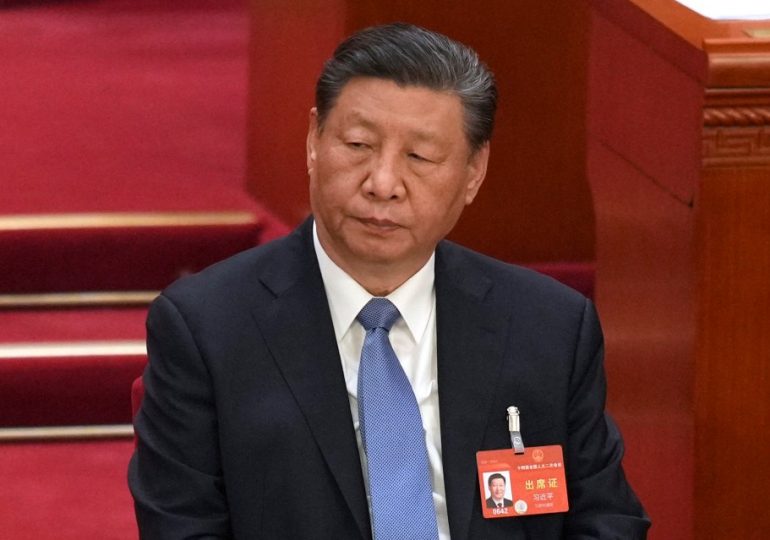CHINA has bragged about its merciless execution of an alleged “US spy” in an unprecedented detailed admission.
The man’s death sentence and execution were disclosed in a chilling propaganda documentary by the country’s top counter-espionage agency – the Ministry of State Security.
APXi Jinping’s China has bragged about executing a man accused of espionage in a new propaganda doc[/caption]
CCTVHuan Yu (pictured) was accused of being a US spy and was executed in 2016[/caption]
AlamyThe documentary was part of a campaign to mark China’s success in combating foreign espionage[/caption]
Monday marked the first time that China indicated that a man named Huan Yu executed for spying in 2016 had sold secrets to the United States.
State broadcaster CCTV said the Sichuan local had handed over secrets, including details on China’s military communications, to a foreign government.
China previously said he had been paid $700,000 by his foreign handlers, before being arrested in 2011.
In a campaign video to promote China’s success in combating foreign espionage, CCTV confirmed that Huang Yu was executed in May 2016, just a month after his conviction and death sentence were announced.
China had never given no details of the country Huang was accused of assisting and did not explicitly mentioned the country on Monday’s propaganda clip.
However, it made sure to show images of an American flag and the US Capitol building.
According to the documentary, Huang Yu, a researcher at a top-secret communication system development project, sent a message to “the website of a certain country’s spy agency” with confidential Chinese military codes.
Huang was upset after being dismissed from a unit working on the project owing to poor job performance, and he had expressed a desire to defect, according to the report.
After the legitimacy of the codes was established, Huang was recruited by an unknown foreign intelligence organisation and trained in Hong Kong and Bangkok.
The propaganda documentary went on to claim he not only sold “core secrets” through his profession, but also deceived his wife, who worked at the same institution, into duplicating classified documents that he could pass on in exchange for further cash.
The death penalty around the world
There are 54 countries worldwide still retaining the capital punishment in law and practice.
Some of them include:
CHINA: In China, the death penalty is still used extensively, with thousands of executions reported each year. The exact number of executions is considered a state secret, but China is believed to have one of the highest execution rates in the world. The death penalty can be applied to a wide range of crimes, including non-violent offences such as drug trafficking.
VIETNAM: In Vietnam, the death penalty can be imposed for a variety of crimes, including drug trafficking, murder, and other serious offences. The methods of execution typically include lethal injection and firing squad.
UNITED STATES: In the United States, the death penalty remains a controversial topic. While it is legal at the federal level and in many states, its use has declined over the years due to concerns about fairness, effectiveness, and the risk of executing innocent people. Some states have abolished it altogether, while others still actively carry out executions, though less frequently than in previous decades.
IRAN: In Iran, the death penalty is also used extensively, often for crimes such as drug trafficking, murder, adultery, and political dissent. The methods of execution include hanging, stoning, and firing squad.
SAUDI ARABIA: In Saudi Arabia, the death penalty is used as a punishment for various crimes, including murder, drug trafficking, apostasy, and sorcery. Executions are typically carried out by beheading in public squares, although other methods such as firing squad and stoning have also been reported.
NORTH KOREA: North Korea is known to have one of the most secretive and authoritarian regimes in the world, and information about its legal system, including the use of the death penalty, is limited and often difficult to verify. However, reports from defectors and human rights organisations suggest that executions, including public executions, are carried out for various offences deemed as threats to the regime’s power. These offences may include political dissent, attempting to defect, or other acts perceived as disloyal to the government. Officially, the North Korean government does not release information about the use of the death penalty.
SINGAPORE: Singapore retains the death penalty and applies it for certain serious crimes, such as drug trafficking and murder. The country has strict laws regarding drug offenses, with the death penalty being mandatory for certain quantities of illegal drugs. Singapore’s government argues that the death penalty is necessary to maintain public safety and deter crime. Executions are typically carried out by hanging.
Huang was accused of leaking “a shocking amount” of classified information concerning the Communist Party’s, government agencies’, and military communication networks, as well as companies like as banking and telecoms.
These included design, technical specifications, secret algorithms, source codes and programmes.
Huang received the highest sentence for spying that caused “serious harm” to China’s national security and was executed in May 2016.
The documentary also revealed new details about a former Taiwan researcher in the Czech Republic who spied for Taiwan.
Cheng Yu-chin, sentenced to seven years for espionage in 2022, was recruited by Taiwan’s intelligence agency during his PhD studies in Prague.
He stole secrets from mainland China and was paid NT$2.76 million to identify infiltration targets.
The doc also covered Lee Henely Hu Xiang, a Belize businessman sentenced to 11 years for funding Hong Kong protests, and the “two Michaels,” Canadians detained in China.
The documentary criticised Canada’s stance on their detention and highlighted China’s crackdown on Capvision Partners, citing national security risks in technology, defence, and medicine sectors.
The ‘Sharpening the Sword’ propaganda doc was part of a run of stories and videos released ahead of a day dedicated to promote national security awareness and citizen vigilance established under President Xi Jinping nine years ago.
In a second statement on Monday, China’s State Security Ministry said it will work to “create sharp weapons” under the law to combat spying.
Last year, lawmakers enacted a broad amendment to China’s anti-espionage legislation, prohibiting the transfer of any material deemed critical to national security, which alarmed some international firms and investors.
The Ministry also issued a three-minute film showing an apparent reenactment of a Chinese spy infiltrating meetings, offices, and labs to gather information before being caught.
It was unclear whether the video was referring to a specific case.
Also on Monday, a comment in the Communist Party mouthpiece People’s Daily stated that China has made accomplishments in national security over the last decade, making it a leading country “with the best sense of security”.
“We have withstood and fought back against extreme external suppression and containment, and on a series of major issues involving Hong Kong, Taiwan, Xinjiang, Tibet, maritime affairs, and human rights, we have fought hard and won one tough battle after another,” it said.
XChen Yixin, Minister of State Security in China[/caption]
Leave a comment








